Q&A: The dirty tackles, head-butts and upsets: A history of the 83-year U.S.-Mexico soccer rivalry
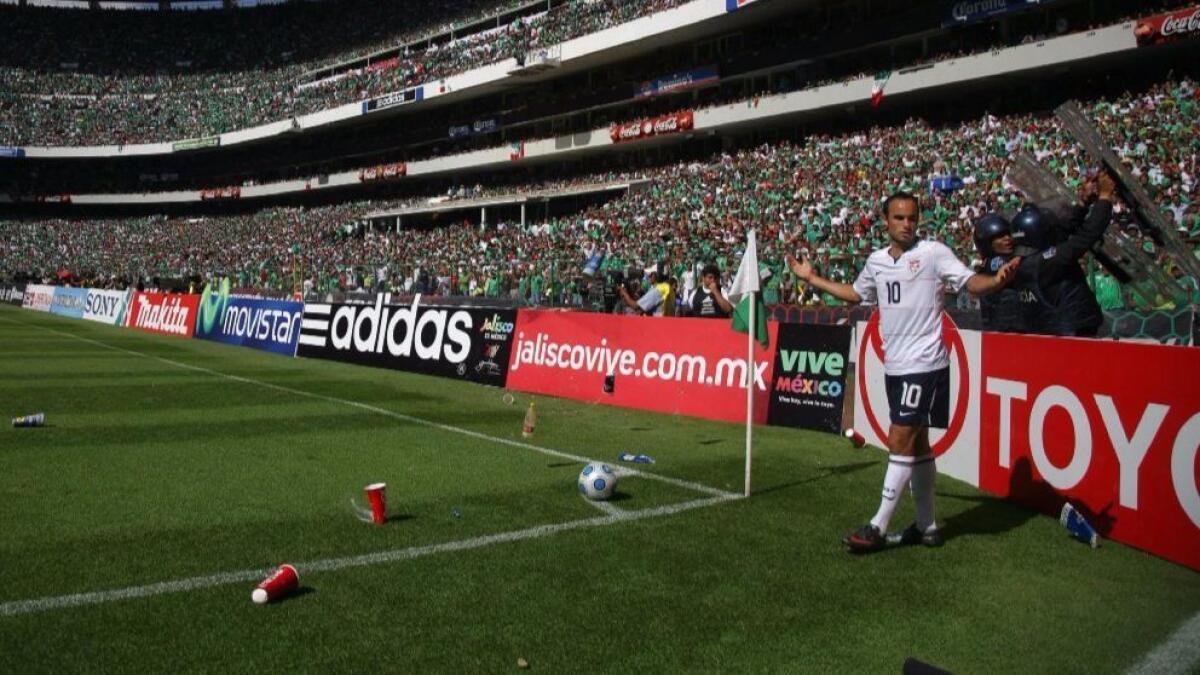
The U.S. played Mexico in soccer for the first time in 1934, winning 4-2 in a World Cup qualifier.
It would be 46 years and 25 games before the U.S. would win again. But in the last 17 years what had been a hopelessly one-sided competition has become one of soccer’s most spirited rivalries, with the U.S. going 13-7-5 since 2000. The rivalry will be revived Sunday when the U.S. heads to Estadio Azteca, Mexico’s imposing home fortress in the suburbs of the Mexican capital, for a crucial World Cup qualifier.
Times soccer writer Kevin Baxter spoke to nine retired players, from both sides of the field, to get their take on the rivalry’s meaning, and why it endures.
The panel:

Jared Borgetti: The second-leading scorer in Mexican history with 46 goals, he played for the national team from 1997-2008. Now an analyst for ESPN Deportes.
Carlos Hermosillo: Scored 35 times for Mexico — tied for third all-time — between 1984-97. He is a commentator with Telemundo.
Stuart Holden: Appeared in 25 games for the U.S. between 2009-13. Works as a commentator for Fox Sports.
Cobi Jones: Holds the national team record for appearances with 164. Serves as an analyst on
Alexi Lalas: Played in 96 games with the U.S. between 1991-98. Now an analyst for Fox Sports.
Pavel Pardo: His 146 appearances with the Mexican national team between 1996-2009 rank second all-time. Serves as an ambassador for the German
Claudio Suarez: His 177 international appearances between 1992-2006 is not only the Mexican record, but they are the third-most caps in soccer history. He is a commentator with Fox Deportes.
Eric Wynalda: The former U.S. record-holder for goals (34), he played internationally from 1990-2000. Now a soccer commentator for Fox and Sirius XM.
(Comments have been edited for space and clarity.)
What makes this game so big?
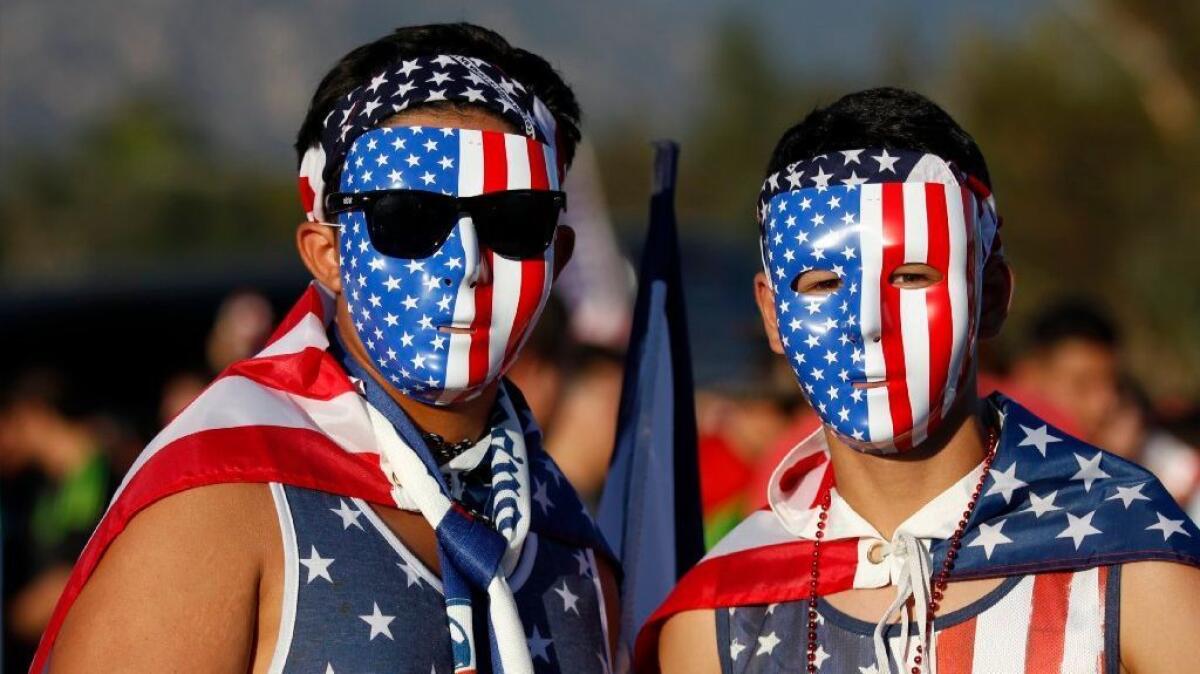
Jared Borgetti: For Mexico, losing to the United States is something serious. It’s something the people hate. Especially at home.
Alexi Lalas: There’s still an element – and we experienced this in all the places where we went – were oftentimes many of these countries, there was nothing that they could necessarily compete with us in and come out on top. Other than soccer. It was their one moment to be better than the United States in something. And they savored that moment.
Pulisic delivers U.S. 2-0 victory over Trinidad and Tobago in WC qualifier »
Carlos Hermosillo: Playing against Honduras, playing a qualifier against Costa Rica, those games are important and difficult. But playing against the U.S. is something else entirely. You don’t just get three points. You win the happiness of the fans, of the Mexicans who live in the United States. The games were completely different because of the rivalry. There was a lot of courage and a lot of clawing.
Pavel Pardo: Don’t forget that we are neighbors. It’s more for your country. It’s more for your fans. Every game, you don’t want to lose. But especially these games. You have to beat them.
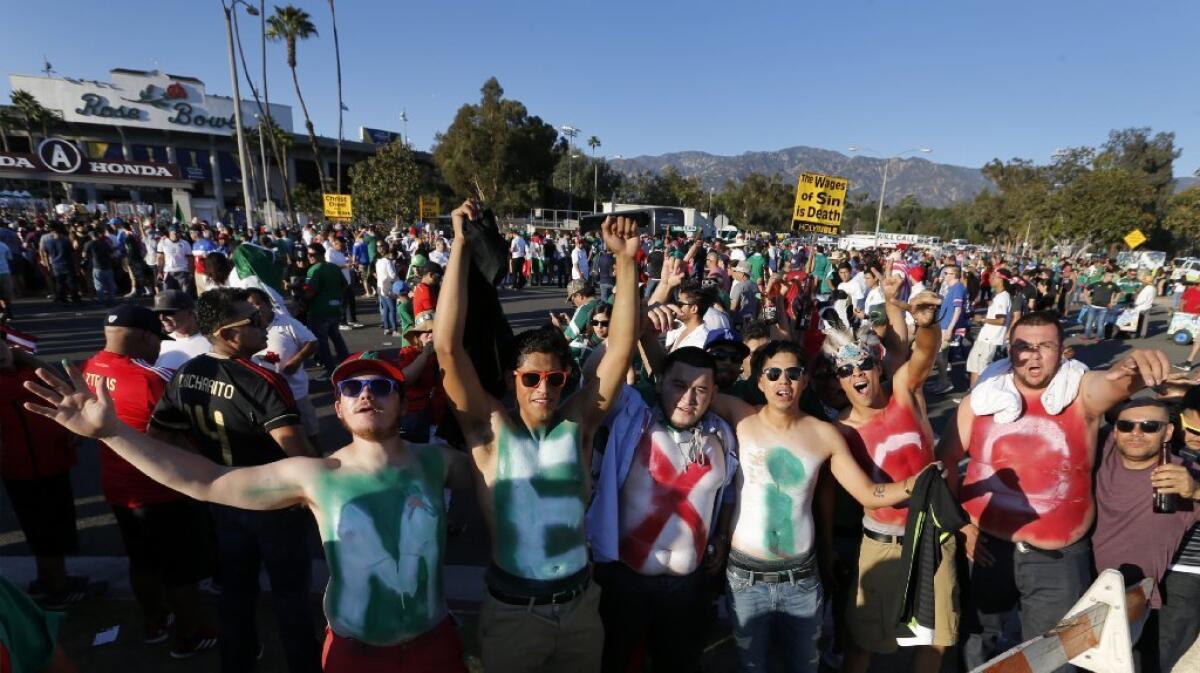
How does it stack up against other rivalries in global soccer?
Stuart Holden: To me, it’s the best in the world. I know Real Madrid-Barcelona. I know Boca-River. There was no one bigger than U.S.-Mexico. Just to be a part of that rivalry, that’s what I always wanted as a soccer player. There’s an added intensity. Your blood is already boiling before the game starts. There is this aura around this.
Eric Wynalda: The game demands full commitment and concentration — on all levels — because you didn’t want to screw up in that game. And you know that this is the one that’s going to be looked at with immense scrutiny. It’s the most enthusiastic crowd you’re ever going to come across. The cauldron that you go into in that environment.
Landon Donovan: This isn’t a game where you pull out of a tackle because you’re thinking about preserving yourself for the rest of the season. This is the game where — especially given the circumstances of where the U.S. is in the qualifying right now — it’s sort of all or nothing and you’ll see that in the way they play.
Claudio Suarez: The atmosphere was always very [emotional]. Sometimes it seemed like someone was going to start throwing punches. Fortunately it never came to that. But there was great passion in every game.
Sunday’s game will be played In Mexico City, where the U.S. has won just once in 22 tries. Why is playing at Estadio Azteca, which has been refurbished, so impenetrable for the U.S.?
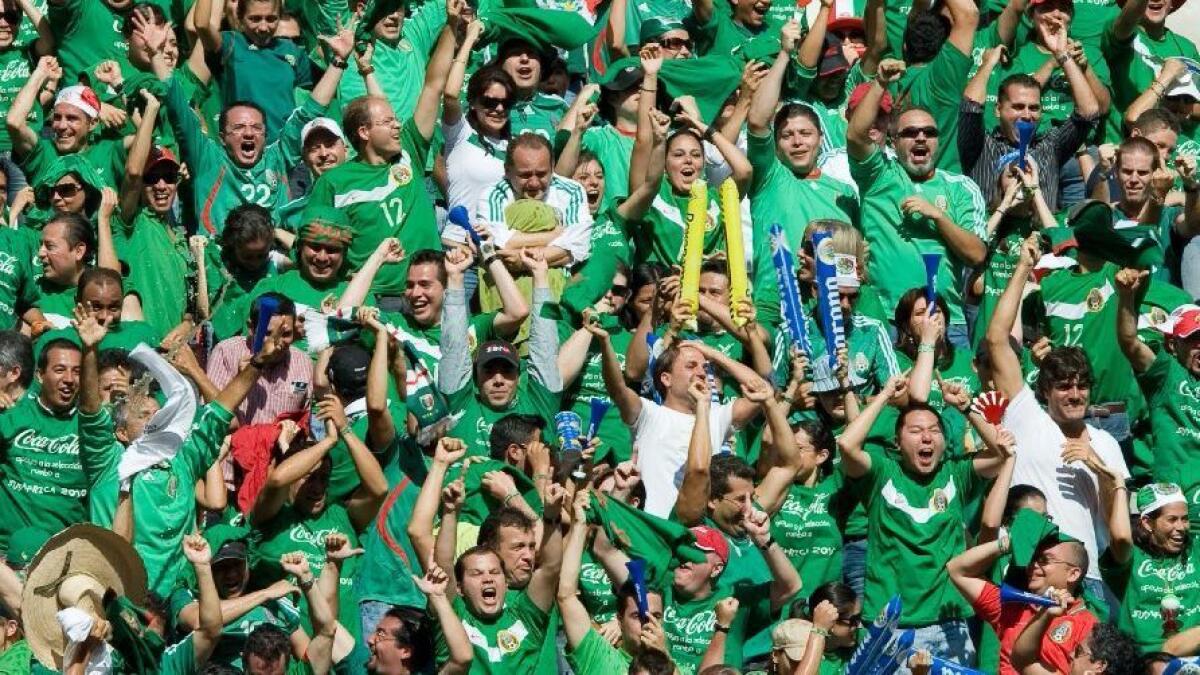
Cobi Jones: Just the atmosphere going into the old stadium, having the certain bit of an aura about it knowing the history of Azteca. People don’t realize that in Azteca they pipe in noise. So before the game, when you go to check out the field before warm-ups, you hear it. That’s a little bit of that gamesmanship. I remember looking up and there were effigies of American players hanging over the side by their neck. Things like that were constant. It was nuts.
Borgetti: It’s a place where Mexico feels a lot of support, where we can feel the fans are behind us. It’s high altitude. It’s a tough place for visiting teams to play.
Donovan: To me, that is as difficult a place to get a result as anywhere in the world. You’re playing against, generally speaking, a top 10 or top 15 team in the world. Then you add in the altitude. You add in the smog, which makes it hard to breathe. Oftentimes it’s very hot there. One hundred thousand people chanting and cheering against you. And all of that makes for a really difficult place to play and really difficult to win.
Pardo: You have confidence at home, to play in your country and to play in your house. Especially with 100,000 people supporting you. The atmosphere that you have in Estadio Azteca, that kind of game, it’s amazing.
Cobi, you talk about the gamesmanship, the stuff Mexico did to interrupt your focus and concentration. How was that different in these games?
Jones: If it didn’t happen, that’s out of the ordinary. It became second nature for us to really understand that was going to happen. How you deal with it, that’s the most important part.
Lalas: You were conditioned to expect all sorts of ridiculous stuff. Not making a training facility available on time. Or taking forever to open a gate or a door. Your ability to accept that and just kind of Zen out and flow with it contributed to how well, ultimately, you were able to comport yourself on the field when the whistle finally blew.
Donovan: You had things thrown at you. It was anything. Bags of urine, though not so much in the later years. Coins and batteries. Beer bottles for sure.
Holden: During the [2009]
The 2002 World Cup was a seminal moment in the rivalry, with the U.S. beating Mexico 2-0 in the knockout round. What is the legacy of that game?
Jones: The original Dos a Cero. That game really changed the way Mexico went about things. There are some players out there that should probably thank us for what we did. All of sudden they got players that were much more physical, much more direct. Players like [Giovani] Dos Santos, Chicharito [Javier Hernandez], [Andres] Guardado — a lot of players that just have the drive and energy where it’s more direct play, along with the technical skill. The Mexico federation started looking at different players and that happened from that 2002 World Cup.
Hermosillo: With the U.S. there was the era before coach Bora Milutinović and the era after. That’s when the Wynaldas, the Alexi Lalases, various players [came]. Tony Meola. That’s when American soccer really started. Then came MLS, which produced a lot more players. It’s good for Mexico and it’s good for soccer in the United States too.
Wynalda: Before my first game against Mexico, in 1991, I was like, ‘These guys are so good.’ Bora Milutinović had just coached them. His attitude in the locker room was, ‘What are you guys worried about? You’re better than them.’ Nobody had ever said that. That mentality switch is where everything changed. We went out there believing we were going to be the better team. And we were. Everything changed after that.
Suarez: What made them better was MLS. Little by little they built a stronger foundation. And from that base came Landon Donovan. So when you talk about the growth of soccer in the U.S., the work of MLS was important. It gave players more experience, a place to play. And that started making things a little more complicated for Mexico.
But that wasn’t the first game that changed the direction of the rivalry. Alexi you mentioned the 1997 World Cup qualifier before 115,000 fans in Azteca that ended in a scoreless tie, the first point the U.S. had ever won in Mexico City.
Lalas: It would be even more significant as the rivalry continued to get bigger and bigger. It was still Azteca and it was still a fortress. To go down there and to be able to do it and to see how it reflected on us and our progression since the ’94 World Cup and all that, that for me is an important one.
Jones: That was a defining moment when you talk about just going in there and getting the result. For a U.S. Soccer side that was really just starting to get its feet and really starting to have things go our way, we did all right. Our era at Azteca really established that initial rivalry of the U.S. and Mexico.
Something else happened in that World Cup game, when Mexico’s Rafa Marquez was ejected for kicking, then head-butting you, Cobi. So who is the dirtiest player you faced in the rivalry?
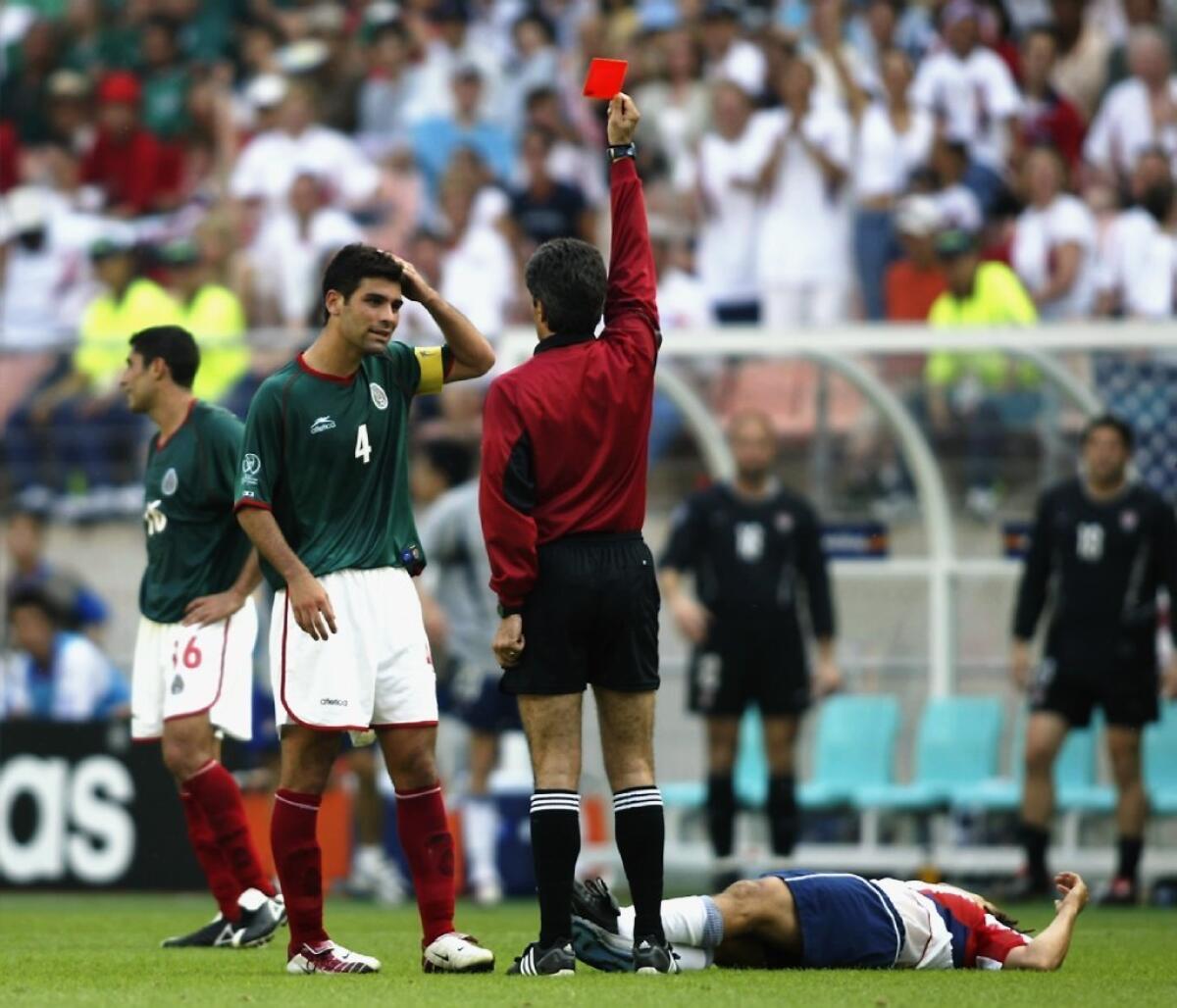
Jones: I’ll go with the whole Mexican team. They’re all dirty (laughs).
Pardo: Alexi Lalas. Every ball, he killed you. Part of the ball and part of your neck.
Lalas: That’s not true! Look, if it is true, it’s because I learned from the best. And when I say the best, it means all the Mexican players I played against. The dark arts were in full effect at all times.
Donovan: Particularly after that World Cup game, it was really nasty. [Rafa] Marquez had some nasty challenges. Cuauhtemoc Blanco had some nasty challenges. Luis Hernandez was pretty nasty with some of the things he said and did. It got a little more personal and nasty.
Was there really a hatred between the teams and the players?
Lalas: The big picture and the consequences and what’s at stake are obvious. We played so many games against Mexico and so that developed the rivalry and that competition. And it bred that hate.
Wynalda: I have a big problem with anybody that brings hate into this. I was in that boat to a certain extent. I thought that we had to bring some sort of hatred. But the longer you play the game and the more you understand about Mexico, you do understand why they’re rooting against you. There’s so much inter-political stuff that is going on that causes people to bring out what we call passion or you can call whatever you like.
Hermosillo: On the field against the United States, I didn’t have any friends. Off the field, yeah.
Holden: You hate them because you know they’re a good player. But you also hate them because you know when you go into a tackle or whatever, there’s a little bit of a push or there’s mouthing off. And when they’re winning … they love to rub every last little bit of it in. Those are the moments that sting for me.
There have been other bitter moments in the rivalry. Like the stare down of Borgetti by U.S. defender Oguchi Onyewu in a 2005 World Cup qualifier in Columbus, the slap attack Mexican assistant Francisco Ramirez launched against U.S. defender Frankie Hejduk in a 2009 qualifier at the same field and Ramon Ramirez’s knee to Lalas’ groin. Do those feelings carry on off the field too?
Borgetti: It’s part of the game. Nothing more.
Jones: It is just football. Everybody’s passions get high. That’s why we’re here talking about it. I reserve the right to continue to talk about the head butt and everything from Marquez. But I understand that it’s part of the game.
Lalas: We’ve been out to dinner with them and we laugh about that stuff. These moments, they’re fun and they’re theater and they’re drama. And in the moment they can set a tone or they can change the course of the game. But for the most part it’s stuff that happens in the course of the game.
Pardo: When you play the game you have to win. And then, when the game is finished, it’s finished. In the battle on the field, it’s a battle. And then when it’s finished, it’s a sport.
Who was the most difficult opponent you faced in the rivalry?
Borgetti: Well, not the most difficult but the most important for the United States to change things was Landon Donovan.
Donovan: For most of his career Marquez was difficult to play against because of what he could do with the ball. When you play against a defender who’s not good on the ball, it’s almost a time to rest. But when you played Mexico, when he has the ball, it was almost when they’re at their most dangerous.
Pardo: Because I played right back in the games against the U.S., I had to defend Eric Wynalda. And Wynalda was an amazing player.
Which opponent did you respect the most?
Donovan: There are two, Pardo and [Carlos] Salcido. Those two, after every game that we played, win, lose or draw, would shake your hand, say ‘good game’ and be respectful. Especially as I got older I always had a lot of respect for them because of that.
Pardo: Landon. He had the skills. Playing against Landon Donovan was tough, Marcelo Balboa, you respect those guys. Claudio Reyna.
Lalas: Suarez. He was so smooth. And classy as an opponent off the field.
Wynalda: Pardo was the smartest player I ever faced. He was such a gentlemen. And we had amazing battles. But he was the one guy that no matter what happened, he never lost his cool. We were two boxers that were going to fight and punch and beat each other up. And when the game was over, there was always a hug.
Follow Kevin Baxter on Twitter @kbaxter11
ALSO
Road to success never ventured far from home for Galaxy's Gyasi Zardes
Galaxy's Giovani dos Santos named to Mexico's Confederations Cup roster




